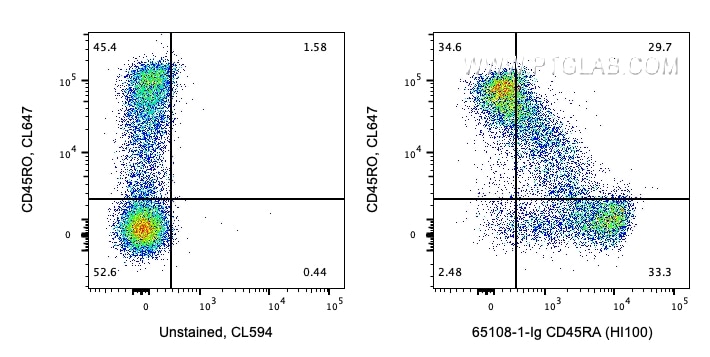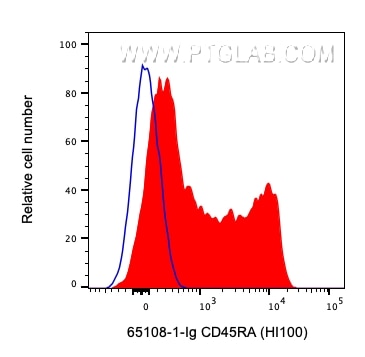Anticorps Monoclonal anti-CD45RA
CD45RA Monoclonal Antibody for FC
Hôte / Isotype
Mouse / IgG2b, kappa
Réactivité testée
Humain
Applications
FC
Conjugaison
Non conjugué
CloneNo.
HI100
N° de cat : 65108-1-Ig
Synonymes
Galerie de données de validation
Applications testées
| Résultats positifs en cytométrie | CMSP humaines, |
Dilution recommandée
| Application | Dilution |
|---|---|
| This reagent has been tested for flow cytometric analysis. It is recommended that this reagent should be titrated in each testing system to obtain optimal results. | |
| Sample-dependent, check data in validation data gallery | |
Informations sur le produit
65108-1-Ig cible CD45RA dans les applications de FC et montre une réactivité avec des échantillons Humain
| Réactivité | Humain |
| Hôte / Isotype | Mouse / IgG2b, kappa |
| Clonalité | Monoclonal |
| Type | Anticorps |
| Immunogène | s/o |
| Nom complet | protein tyrosine phosphatase, receptor type, C |
| Numéro d’acquisition GenBank | BC014239 |
| Symbole du gène | CD45 |
| Identification du gène (NCBI) | 5788 |
| Conjugaison | Non conjugué |
| Forme | Liquide |
| Méthode de purification | Purification par affinité |
| Tampon de stockage | PBS with 0.09% sodium azide |
| Conditions de stockage | Store at 2-8°C. Stable for one year after shipment. |
Informations générales
CD45, also known as protein tyrosine phosphatase, receptor type C, is a type I transmembrane protein expressed on the surface of all haematopoietic cells with the exception of erythrocytes and platelets (PMID: 3489673; 28615666). CD45 is a pan-haematopoietic cell marker and has been shown to be essential for T- and B-cell activation and signalling (PMID: 9429890; 16378097). CD45 exists as multiple isoforms due to alternative splicing of three exons (4, 5, and 6, designated A, B, and C) in the extracellular domain (PMID: 12414720). CD45RA is expressed on naïve T cells, B cells, and monocytes (PMID: 1830500; 14687231).
Protocole
| Product Specific Protocols | |
|---|---|
| FC protocol for CD45RA antibody 65108-1-Ig | Download protocol |
| Standard Protocols | |
|---|---|
| Click here to view our Standard Protocols |



